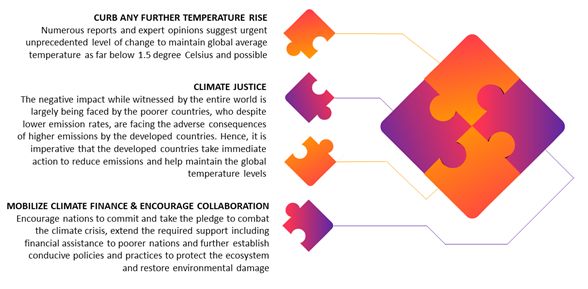INTRODUCTION
The Conference of Parties, more commonly known as COP, is the apex decision-making body that undertakes the monitoring and reviewing of effective implementation of the United Nations Framework Convention on Climate Change (UNFCCC). It is a collaboration of 197 nations, that have come together to address the global climate crisis. Constituted in 1994, the apex body organized its first event in 1995, COP1 in Berlin, Germany. It has since, conducted 25 of such annual events, with COP25 held in December 2019 under the Presidency of the Government of Chile in Madrid, Spain. The end of October marks the beginning of COP26, to be held in Glasgow, Scotland, from 1st to 12th November, 2021.
WHAT IS COP26?
While many may consider COP26 as yet another international summit on climate crisis, it holds much higher significance in the global community, as a pivotal moment focused on climate change. The annual event could help determine the response to climate across the globe and how well-equipped are we to combat some of the worst climate disasters that lie in the not-so-distant future.
COP21, which took place in Paris in 2015, was attend by 196 countries. It has been an instrumental event as it led to the configuration of the Paris Agreement. The upcoming COP26 is aimed at uniting the world to develop mitigation strategies to address climate risks and further accelerate action towards achieving targets set under the Paris Agreement.
The Paris Agreement was adopted on 12th December, 2015, and came into force on 4th November, 2016. It marked the turning point in the fight against global climate crisis and at present comprises of 194 parties committed to addressing issues pertaining to global risk in temperature levels. The Agreement requires signatories to submit every 5 years, their plans to address climate change and communicate the action taken towards the set targets, which are known as the Nationally Determined Contributions (NDCs). Furthermore, to track progress, the Enhanced Transparency Framework (ETF) has been established wherein starting 2024, the signatory parties will be required to report on the action undertaken, progress of mitigation of climate crisis and the support provided or received from other nations.
The COP26 is expected to have a large number of companies unveil their plans to reduce carbon emissions and achieve net zero targets by 2030. Many participating countries are also expected to undertake pledges around optimum use of resources including ending coal use, switching to electric vehicles, and integrating more sustainable and environmentally friendly activities and initiatives.
WHO IS EXPECTED TO ATTEND COP26?
About 30,000 people are expected to attend the event, including world leaders, representatives of observer organizations, and journalists. The global event facilitates three categories of attendees, which include representatives of Parties to the Convention and Observer States, members of the press and media, and representatives of observer organisations.1
SOME OF THE KEY TOPICS OF DISCUSSION AT COP26 INCLUDE –

COP26 EXPECTED OUTCOMES
- Achieve global net zero by mid-century and maintain 1.5 degrees temperature levels – The event is aimed at empowering nations across the globe and encouraging them to implement robust schemes and initiatives to reduce carbon emissions and carbon footprint. The event proposes to formulate strong synergies and plans to be carried out in a phased manner and to further enhance investment in renewable energy and other sustainable sources of development.
- Protection of communities and natural habitats – The climate crisis has led to devastating and catastrophic effects across the globe and therefore, there is an urgent need for countries to adapt to policies and standards that protect and restore ecosystems and further help develop the right warning systems and resilient agriculture & infrastructure to reduce harmful emissions.
- Mobilize finance – While in the past, developed countries have made contributions and pledged large sums of monies towards climate finance; nations this year are expected to increase their contributions and commit to substantially larger amounts in the finance sector to secure global net zero targets. As per the President of COP26 the commitment of USD 100 Billion would be vital support needed for on ground changes to protect the planet & its people.
- Collaborative working – It is a global crisis that requires global redressal. Therefore, governments, private companies and other organizations have realised the need for collective action and are accordingly seen making a conscious collaborative efforts and commitment to accelerate climate action.
Run-up to COP 26 - TWO IMPORTANT REPORTS ON CLIMATE CHANGE IN 2021 –
- Intergovernmental Panel on Climate Change (IPCC) -
IPCC was created by the World Meteorological Organization (WMO) and the United Nations Environment Programme (UNEP) to help countries (195 member countries) at all levels including providing scientific information which can be put to use by these countries for the development of climate policies. The IPCC reports act as key input for all the international climate change negotiations and is likely to serve as the cornerstone of climate science in the coming years.
Since its constitution, the Panel has released 5 reports known as Assessment Report (AR) to provide comprehensive information and evidentiary proof of the changing climate system. This year, it released the AR6 focused on the current status of the world and its probability to soon pass the 1.5C and 2C warming temperature levels. This analysis will play a crucial role in pursuing governments and people to take urgent action to protect and save the plant from any further disruption. Renowned community of researchers and policymakers across the globe are more now frantic about the long term effects associated with crossing the 1.5C and 2C limits which has been defined as per multi-year average rather than a single year. The latest report provides information on the different levels of risks associated with warming levels. It puts forth the interlinkage between humans and the environment and the adverse impact of our activities over the years that has led to the present crisis. Additionally, the report also highlights opportunities to adapt adequate mitigation plans and strategies on emission pathways.
- Climate Action Tracker (CAT) -
CAT is a comprehensive rating system that tracks government targets against the Paris Agreement. In its latest global update, it revealed how nations across the globe are significantly falling short on their commitment to achieving reduced rise in global temperature and lower emission rates.2 As per the report, except for a few, majority of the governments remain highly insufficient in their contribution to combatting the climate crisis. With COP26 around the corner, the only country to be on track with its target under the Paris Agreement is the Gambia in Africa, scoring an overall 1.5 degree compatibility. Besides that, with respect to domestic action, the United Kingdom is the only industrialized nation to have a domestic target under the CAT rating system.
The global update suggests that almost all developed nations need to accelerate their efforts, strengthen targets and implement strong policies, frameworks and action plans to reduce global rise in temperature. Furthermore, this being the decade of change, it is crucial for countries to regularly update targets and policies, so as to ensure long-term achievement of goals and being on track with the commitment to curb the climate crisis. The assessment also shows the need for alignment between 2030 targets and net zero goals to fully realize their ambition and achieve the desired outcome to reduce global temperature increase.
The third important voice discussion in 2021 happened in last week of April 2021 wherein state heads of 40 countries came together on a virtual platform and showed their commitment towards climate change policies.
CONCLUSION
With the rapid increase in global climate change, it is essential to periodically track progress of nations towards the global aim of reducing temperature to 2°C and further pursuing efforts to limit warming to 1.5°C in the coming decade. Organizations like IPCC, CAT, Climate Analytics and NewClimate Institution are in the forefront when it comes to global reporting on government action and mitigation strategies implemented across the globe. The latest reports mentioned herein demonstrate how irrespective of the countries performance, a common factor was policy implementation and urgent action. This reflects how it is crucial for governments to establish policies in line with global benchmark standards and further action to mitigate climate related issues must be in alignment with the targets under the Paris Agreement and other accords focused on address the climate crisis. Another essential element for nations to succeed and improve their ratings is integration of international support and seeking climate finance. Leaders across the globe have time and again accepted that to tackle the global rise in temperatures, nations need to unite. It requires collective effort to create, invest and scale up revolutionary contributions to achieve targets of climate action. Lastly but very important would be the USD 100 billion dollar funding commitments for changes to be done on ground !
Footnotes
1. For further information on getting involved at the COP26 event, please click here - https://ukcop26.org/the-conference/get-involved/
2. https://climateactiontracker.org/documents/871/CAT_2021-09_Briefing_GlobalUpdate.pdf
The content of this article is intended to provide a general guide to the subject matter. Specialist advice should be sought about your specific circumstances.



